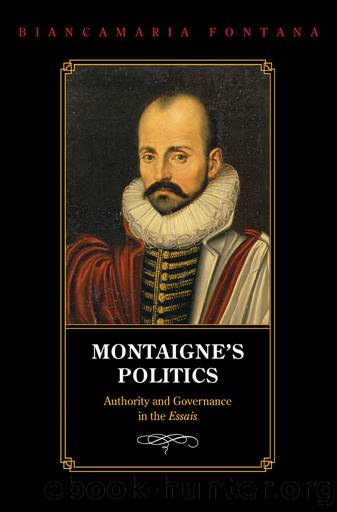Montaigne's Politics by Fontana Biancamaria;

Author:Fontana, Biancamaria;
Language: eng
Format: epub
Publisher: Princeton University Press
Published: 2022-12-15T00:00:00+00:00
Authorities on Credit
One important dimension of human experience in which trust clearly played an essential role was the shaping of menâs beliefs and opinions. Most of what human beings knew, or thought they knew, about this world and the next, they learned not from direct experience, but from the experience, recollections, and beliefs of other people. This process of learning from the authority of others applied both to oneâs immediate environment (as in the case of a child learning from her parents) and to more organized forms of knowledge such as history, geography, science, or theology. Historical facts, like geographical accounts or scientific doctrines, were acquired through the testimony of other people, most of the time people who had been dead for a long time, whose narratives, statements, and observations had been transmitted by oral tradition or recorded in writing. Religious dogmas were of course a privileged area of authority, since they were supposed to reveal Godâs own truth: yet even in this particular area one should distinguish between faithâwhich was directly inspired by Godâand the teachings of Revelation, which were transmitted through the intermediary, and therefore the authority, of human agents.
Montaigne suggested that establishing the truth about any claim based upon authority was a process similar to that of judging the reliability of witnesses at a judicial inquiry. Experience had taught him how the exercise of assessing testimony was on the whole a risky one, partly because people were naturally given to telling lies, partly because even honest witnesses would often prove mistaken or confused. Inevitably, complex historical events were far more difficult to reconstruct than isolated incidents, since witnesses, even when they were reliable and well-informed, would have a partial or distorted perception of the wider context: a military commander on the battlefield, for example, though in theory an ideal witness, in practice would see the battle from a particular perspective and miss out on lots of things that went on all around him at the same time.7
Taking into account the uncertainty of individual perceptions, Montaigne believed that, as a rule, the reputation and credibility of witnesses carried more weight than the plausibility of the information they imparted. Jean Bodin, for example, was wrong when he questioned Plutarchâs account of the self-sacrificing spirit of the Spartans: his judgment was based upon the fact that certain forms of heroic behavior seemed excessive and impossible to the modern mind; yet on this point he should have trusted Plutarch, who had a far better understanding of the mentality of ancient peoples than any contemporary author.8 Another example was provided by the experience of supernatural events. As a rule it was reasonable to be suspicious of any reports of ghostly apparitions, monsters, and miracles: such phenomena, when they were not a deliberate hoax, were often the creation of diseased minds or fictions of popular imagination. However, if an authoritative Christian writer like Saint Augustine described a miraculous eventâa blind child whose sight was restored through the intercession of a holy relicâsupporting his
Download
This site does not store any files on its server. We only index and link to content provided by other sites. Please contact the content providers to delete copyright contents if any and email us, we'll remove relevant links or contents immediately.
The Power of Myth by Joseph Campbell & Bill Moyers(681)
Four Shakespearean Period Pieces by Margreta de Grazia(666)
A Social History of the Media by Peter Burke & Peter Burke(640)
Inseparable by Emma Donoghue(610)
The Complete Correspondence 1928-1940 by Theodor W. Adorno & Walter Benjamin(510)
Bodies from the Library 3 by Tony Medawar(487)
The Spike by Mark Humphries;(469)
Culture by Terry Eagleton(465)
A Theory of Narrative Drawing by Simon Grennan(461)
World Philology by(452)
Ideology by Eagleton Terry;(445)
Farnsworth's Classical English Rhetoric by Ward Farnsworth(444)
A Reader’s Companion to J. D. Salinger’s The Catcher in the Rye by Peter Beidler(432)
Adam Smith by Jonathan Conlin(425)
Comic Genius: Portraits of Funny People by(410)
Monkey King by Wu Cheng'en(403)
Game of Thrones and Philosophy by William Irwin(400)
High Albania by M. Edith Durham(399)
Early Departures by Justin A. Reynolds(383)
